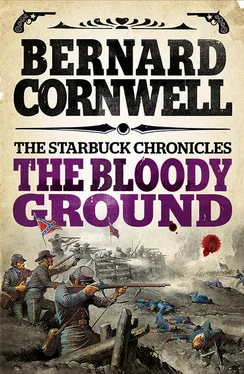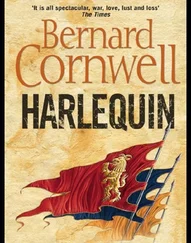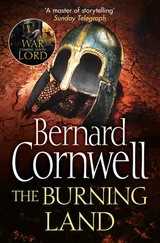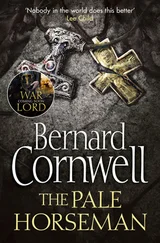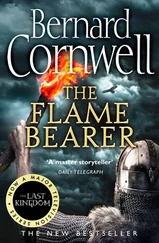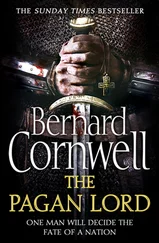Bernard Cornwell - The Bloody Ground
Здесь есть возможность читать онлайн «Bernard Cornwell - The Bloody Ground» — ознакомительный отрывок электронной книги совершенно бесплатно, а после прочтения отрывка купить полную версию. В некоторых случаях можно слушать аудио, скачать через торрент в формате fb2 и присутствует краткое содержание. Жанр: unrecognised, на английском языке. Описание произведения, (предисловие) а так же отзывы посетителей доступны на портале библиотеки ЛибКат.
- Название:The Bloody Ground
- Автор:
- Жанр:
- Год:неизвестен
- ISBN:нет данных
- Рейтинг книги:4 / 5. Голосов: 1
-
Избранное:Добавить в избранное
- Отзывы:
-
Ваша оценка:
- 80
- 1
- 2
- 3
- 4
- 5
The Bloody Ground: краткое содержание, описание и аннотация
Предлагаем к чтению аннотацию, описание, краткое содержание или предисловие (зависит от того, что написал сам автор книги «The Bloody Ground»). Если вы не нашли необходимую информацию о книге — напишите в комментариях, мы постараемся отыскать её.
The Bloody Ground — читать онлайн ознакомительный отрывок
Ниже представлен текст книги, разбитый по страницам. Система сохранения места последней прочитанной страницы, позволяет с удобством читать онлайн бесплатно книгу «The Bloody Ground», без необходимости каждый раз заново искать на чём Вы остановились. Поставьте закладку, и сможете в любой момент перейти на страницу, на которой закончили чтение.
Интервал:
Закладка:
“Wages would help,” Blythe agreed and so, an hour later, he found himself in the altogether less prepossessing company of the brigade commander. Colonel Griffin Swynyard’s queries about Blythe’s captivity were brief, but much sharper than Maitland’s. “Where were you held?” he asked.
“Massachusetts,” Blythe said.
“Where exactly?” Swynyard demanded.
Blythe was momentarily flustered. “Union,” he finally said, reckoning that every state in the United and Confederate States had a town called Union. “Just outside, anyway,” he added lamely.
“We must thank God for your escape,” Swynyard said, and Blythe eagerly agreed, then realized he was actually expected to fall onto his knees to offer the thanks. He got down awkwardly and closed his eyes while Swynyard thanked Almighty God for the release of His servant Billy Tumlin from captivity, and after that Swynyard told Billy he would have the brigade major issue a travel pass permitting Captain Tumlin to report to the army headquarters.
“In Richmond?” Blythe asked, not unhappy at that thought. He had no enemies in Richmond that he knew of, for his foes were all further south, so Richmond would be a fine resting place for a short while. And at least in the Confederacy’s capital he would be spared the bloodletting that would surely follow if Robert Lee took this hardscrabble army of ragged-uniformed men across the Potomac into the north’s plump fields.
“They may send you to Richmond,” Swynyard said, “or they might post you to a battalion here. Ain’t my decision, Captain.”
“Just so long as I can be useful,” Billy Blythe said sanctimoniously. “That’s all I pray for, Colonel, to be useful.” Billy Blythe was doing what Billy Blythe did best. He was surviving.
YOU DON’T SOUND LIKE A SOUTHERNER, POTTER,” CAPTAIN Dennison said and the three other captains who shared the supper table stared accusingly at Starbuck.
“My ma was from Connecticut,” Starbuck said.
“Sir,” Dennison corrected Starbuck. Captain Dennison was more than a little drunk, indeed he had almost fallen asleep a moment before, but now he had jerked himself into wakefulness and was scowling at Starbuck down the length of the table. “I’m a captain,” Dennison said, “and you’re a shad-belly piece of ordure, otherwise known as a lieutenant. You call me sir.”
“My ma was from Connecticut, sir,” Starbuck said dutifully. He was playing his role as the hapless Potter, but he was no longer enjoying it. Impetuosity, if not downright foolishness, had trapped him in the deception and he knew that every moment he stayed in the role would make it more difficult to extricate himself with any dignity, but he still reckoned there were things to learn so long as the real Lieutenant Potter did not arrive at Camp Lee.
“So you picked up your momma’s accent with her ditty milk, did you, Potter?” Dennison asked.
“I reckon I must have done, sir.”
Dennison leaned back in his chair. The sores on his face gleamed wetly in the flickering light of the bad candles set on the dinner table that bore the remains of a meal of fried chicken, fried rice, and beans. There were some of Colonel Holborrow’s beloved peaches to end the meal, though Holborrow himself was not present. The colonel, having carried Sally to the city, had evidently stayed to make a night of it, leaving Starbuck to share this evening meal with the four captains. There were plenty of other officers in Camp Lee, but they ate elsewhere for no one, it seemed, wanted to be contaminated by this handful of officers who remained with the Yellowlegs.
And no wonder, Starbuck, thought, for even the few hours he had spend in the camp had proved enough to confirm his worst expectations. The men of the 2nd Special Battalion were bored and dispirited, kept from desertion only by the ever-present provosts and by their fears of execution. The sergeants resented being posted to the battalion and so entertained themselves with petty acts of tyranny that the battalion officers, like Thomas Dennison and his companions, did nothing to alleviate. Sergeant Case appeared to run the battalion and those men who were in his favor prospered while the rest suffered.
Starbuck had talked with some for the men and they, thinking that he was a harmless lieutenant and, besides, the man who had dared to take Case’s prisoner off the horse, were unguarded in what they said. Some, like Caton Rothwell, whom Starbuck had rescued, were keen to fight and were frustrated that Holborrow appeared to have no intention of sending the battalion north to join Lee’s army. Rothwell was not one of the original Yellowlegs, but had been posted to the special Battalion after being found guilty of deserting from his own regiment. “I went to help my family,” he explained to Starbuck. “I just wanted a week’s furlough,” he added, “because my wife was in trouble.”
“What trouble?” Starbuck had asked.
“Just trouble, Lieutenant,” Rothwell said bluntly. He was a big, strong man who reminded Starbuck of Lieutenant Waggoner. Caton Rothwell, Starbuck suspected, would be a good man to have alongside in a fight. Given fifty other such men, Starbuck knew, the battalion could be made as good as any in Lee’s army, but most of the soldiers were near mutinous through boredom and the knowledge that they were the most despised unit in all the Confederate army. They were the Yellowlegs, the lowest of the low, and no one thing was more symptomatic of their status then the guns they had been issued. Those weapons were still in store, but Starbuck had found the key hanging behind the office door and had unlocked the armory shed to find it filled with crates of old smoothbore muskets. Starbuck had brushed the dust off one musket stock and lifted out the weapon. It felt clumsy, while the wooden shaft beneath the barrel had shrunk over the years so that the metal barrel hoops were loose. He peered at the lock and saw the word VIRGINIA stamped there, while behind the hammer was written RICHMOND, 1808. The gun must have been a flintlock originally and at some time updated by conversion to percussion cap, but despite the modernization it was still a horrible weapon. These old muskets, made for killing Redcoats, had no rifling inside the barrel, which meant that the bullet did not spin in its flight and so lacked the accuracy of a rifle. At fifty paces the big-bore 1808 musket might be as lethal as an Enfield rifle, but at any greater range it was hopelessly inaccurate. Starbuck had seen plenty for men carrying such antiquated guns into battle and had felt sorry for them, but he knew for a fact that thousands of modern rifles had been captured from the North during the summer’s campaign, and it seemed perverse to arm his men with these museum pieces. Such antique weapons were a signal to the Special Battalion that they were on the army’s hind teat, but that was probably a truth the men already knew. They were the soldiers no one else wanted.
Sergeant Case had seen the open armory door and come to investigate. His tall body filled the doorway and shadowed the dusty room. “You,” he had said flatly when he saw Starbuck.
“Me,” Starbuck agreed pleasantly enough.
“Got a habit of poking your nose where it don’t belong, Lieutenant,” Case said. His menacing presence loomed in the dusty shed while his flat, hard eyes stared at Starbuck like a predator sizing up its kill.
Starbuck had thrown the musket to the sergeant, thrown it hard enough to make Case step back a pace as he caught it. “You’d want to fight Yankees with one of those, Sergeant?” Starbuck asked.
Case twirled the musket in his big right hand as though it weighted no more than a cornstalk. “They won’t be doing no fighting, Lieutenant. These men ain’t fit to fight. And that’s why you were sent to us.” Case’s small head jerked back and forth on the ludicrous neck as he spat his insults. “Because you ain’t fit to fight. You’re a bloody drunkard, Lieutenant, so don’t give me any talk of fighting. You don’t know what fighting is. I was a Royal Fusilier, boy, a proper soldier, boy, and I know soldiering and I know fighting, and I know you ain’t up to it else you wouldn’t be here.” Case threw the musket hard back, stinging Starbuck’s hands with the impact of the weapon. The tall sergeant stepped further inside the armory and thrust his broken-nosed face close to Starbuck. “And one other thing, boy. You pull rank on me one more time and I’ll nail your hide to a tree and piss all over it. Now put that musket back where you found it, give me the armory key, and bugger off where you belong.”
Читать дальшеИнтервал:
Закладка:
Похожие книги на «The Bloody Ground»
Представляем Вашему вниманию похожие книги на «The Bloody Ground» списком для выбора. Мы отобрали схожую по названию и смыслу литературу в надежде предоставить читателям больше вариантов отыскать новые, интересные, ещё непрочитанные произведения.
Обсуждение, отзывы о книге «The Bloody Ground» и просто собственные мнения читателей. Оставьте ваши комментарии, напишите, что Вы думаете о произведении, его смысле или главных героях. Укажите что конкретно понравилось, а что нет, и почему Вы так считаете.
